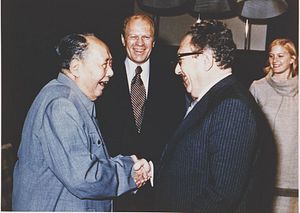In the West, no shortage of commentators were quick to denounce Henry Kissinger as a war criminal upon his death. China’s media, by contrast, hailed Kissinger as an “old friend of the Chinese people” and a “distinguished American diplomat” known around the world for the “wisdom” of his diplomacy.
China’s embrace of Henry Kissinger began with his secret 1971 trip to Beijing to launch the process of normalization of relations between the United States and China. This past July, during Kissinger’s 100th trip to China, he was treated to a personal meeting with Chinese President Xi Jinping in the very meeting place where Kissinger had sat down with Premier Zhou Enlai 52 years earlier. Xi went out of his way to flatter Kissinger: “The Chinese people never forget their old friends, and Sino-U.S. relations will always be linked with the name of Henry Kissinger.”
The term “old friend” has an oddly personal and sentimental ring that seems out of place in a diplomatic context, yet it is frequently applied not only to Kissinger but also to other foreigners who are viewed with favor by the Chinese leadership. The term was first used in a 1956 edition of the People’s Daily in reference to American missionary James Gareth Endicott, who became an unwavering defender of the Chinese Communist Party after the 1949 revolution.
Another early “old friend” was Edgar Snow, an American journalist who joined the Communist forces at their Yunnan base in the 1930s and who wrote a widely influential and flattering portrait of the movement titled “Red Star Over China.” Between 1956 and 2011, over 600 individuals from 123 countries were granted the title of “old friend.”
In his once-classified study of Chinese negotiating behavior written for the RAND Corporation in 1985, former U.S. State Department and National Security Council official Richard Solomon noted: “The frequently used term ‘friendship’ implies to the Chinese a strong sense of obligation for the ‘old friend’ to provide support and assistance to China.”
In her 2000 dissertation for Australian National University, political scientist Anne-Marie Brady quoted from a 1995 official Chinese handbook on foreign affairs:
The more friends we have the better, yet we also have to be selective. We especially want to make friends with such foreigners who are friendly to us, have some social prestige, have economic power, or academic achievements, or have political influence; this will be most advantageous for the achievement of a peaceful international environment and to support our nation’s economic construction.
In short, the term “old friend” is bestowed on individuals considered sympathetic to Chinese views and aims who are in a position to serve China’s interests. An “old friend” will be feted with “special access and privileges” to the extent that they continue to act in ways desired by the Chinese state.
Ryan Ho Kilpatrick pointed out that the two countries accounting for the most “old friends” are the United States and Japan – both having histories of conflict with China. This makes sense because the utility of an “old friend” lies in their willingness to defend China even when this conflicts with the policies of their own government.
Kissinger was a sophisticated man who well understood the transactional nature of his status as an “old friend” of China, and he lived up to his end of the bargain. With access to the highest levels of power in both the United States and China, Kissinger played the role of an intermediary, passing backchannel messages between the leaderships and shaping coverage of events through media interviews and commentaries.
Kissinger sometimes allowed himself to be used by Beijing in ways that were embarrassing to Washington. Xi’s meeting with Kissinger during the latter’s aforementioned trip to Beijing in July 2023, served as an implicit rebuke of the Biden administration, given Xi’s refusal to hold a one-on-one with U.S. climate envoy and former Secretary of State John Kerry, whose visit to Beijing overlapped with that of Kissinger.
Kissinger was of greatest service to China during times of crisis in the bilateral relationship. Shortly following the violent suppression of pro-democracy protests in Tiananmen Square Beijing on June 4, 1989, Kissinger responded to congressional moves to sanction China with an op-ed declaring: “A crackdown was inevitable” and “China remains too important for America’s national security to risk the relationship on the emotions of the moment.”
Kissinger privately counseled then-President George H.W. Bush to resist pressures to punish Beijing and lobbied Congress against sanctions. In November of that year, Kissinger traveled to Beijing where, in a meeting with senior leaders, he is reported to have said regarding international reactions to the massacre: “China’s propaganda work has been insufficient.”
Kissinger gained much as an “old friend” of China. His continued access and relevance in China heightened Kissinger’s value to the many corporate boards on which he served and created business opportunities for his firm, Kissinger Associates. By reminding onlookers of his key role in the opening to China, Kissinger burnished a reputation that otherwise took a beating as critical treatments of his overall record in office proliferated over time.
Friendship is a precious commodity. Long ago, China made an investment in Henry Kissinger by bestowing him with the title of “old friend” along with the privileges that came with it. That investment brought a half century of returns.
































